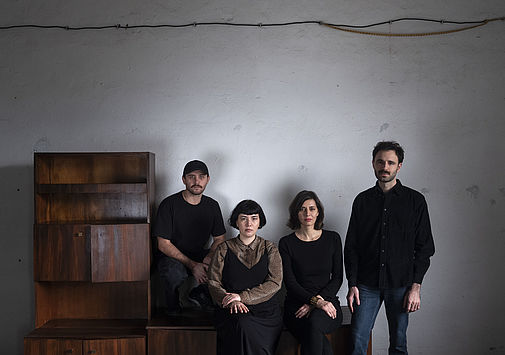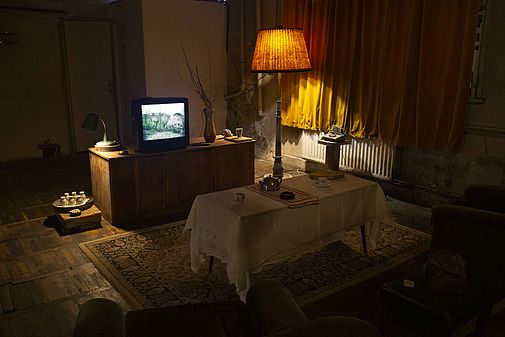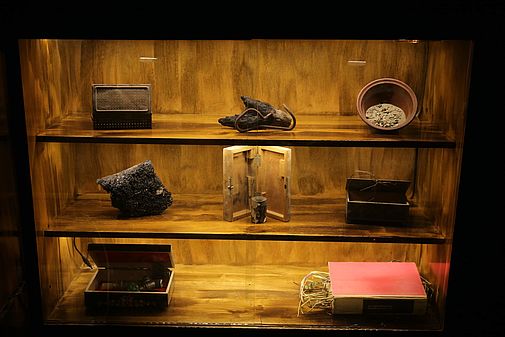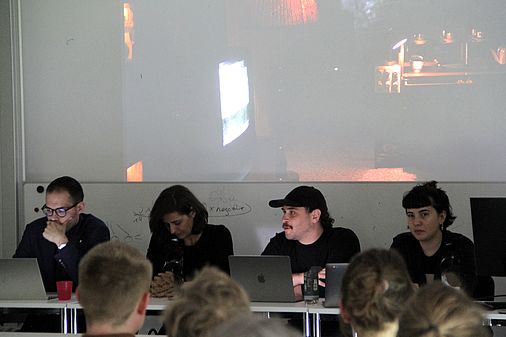Letting Silences Speak
Sharing insights and experiences from interdisciplinary collaborations between academia, artistic practice, curation, and policy-making: The artists' collective The Neighbours in Regensburg.
June 4, 2024
Sit down. Listen. Look around. See the silenced and faded memories of survivors of political violence in labor camps during the communist era in Bulgaria. You may be triggered yourself. Or get an idea of something you have heard about but were lucky enough not to experience: The Neighbours is an interactive multimedia installation in the Bulgarian Pavilion at the 2024 Venice Biennale. On 6 and 7 May, the collective of artists who created this installation discussed their work with Regensburg scholars and the interested public. They were invited by the Leibniz ScienceCampus (LSC) and its partners, including the Center for Commemorative Culture at the University of Regensburg (UR).

Artist collective The Neighbours (from left) Vasil Vladmirov, Krasimira Butseva, Lilia Topouzova, Julian Chehirian. © Studio The Neighbours
UR historian Ulf Brunnbauer, spokesperson of the LSC board and director of IOS, welcomed the artists and workshop participants together with LSC manager Paul Vickers.The Neighbours provides insight into the history of the project, the fieldwork, and the artistic process. The journey begins at the sites of two former Bulgarian labor camps, Belene and Lovech. The camps operated from 1945 to 1989, closing and reopening in between.
Both places are abandoned, a few concrete remains, an illegible plaque found in the thicket. Leftists, social democrats, anarchists, trade unionists, ordinary peasants, young people in "Western style" duffle coats, Roma suffered in these camps. To this day, neither the Bulgarian state nor society has come to terms with this past.
Breaking Silos
Rooms in disarray, pensive seniors, yellowed black and white. Krasimira Butseva, a visual artist and senior lecturer at the London College of Communications, University of the Arts, was born after 1989. When, as a student, she learned of the existence of the labor camps, she googled the sites, visited them, took photographs, tried all sources to gain more insight into the enormity of the camps and the fate of the prisoners. But Butseva understood that "these pictures could not tell the full story.” She began contacting survivors, visiting them, listening to what they had to say. Soon she understood that "all this kind of trauma is missing from history books or museums.”
She found an ideal partner in Lilia Topouzova, an assistant professor of history and creative nonfiction at the University of Toronto and a documentary filmmaker. Together, they continued to collect images of camp survivors. In the early 2000s, the two artists and scholars began their oral history approach, meeting with hundreds of former detainees. The interviewees' homes were full of memorabilia that reflected the trauma of being held captive for their opinions and ideas. They began research in the state archives and intensified their fieldwork with colleagues from various disciplines. The planned art project became social science.

Exhibition view of the living room, The Neighbours, Forms of Trauma, various found objects, tv, video, Studio The Neighbours, Sofia, Bulgaria 2022, Photo: Krasimira Butseva © Studio The Neighbours
Building Bridges
Topouzova's work is positioned at the intersection of history and memory, particularly in relation to political violence, silence, trauma, and public memory. "The state is absent when it comes to commemoration," the scholar notes at the second event with the neighbors on May 7, an artist talk for the interested public led by UR art historian Vera Beyer. The relatively large audience learned that unlike in most other countries of the former Soviet sphere of influence, no glasnost-like processes took place in Bulgaria. Half of the members of an installed truth commission were at the same time in charge of the deliberate purge of the archives that contained the documentation on the camps and the camp inmates. Transitional justice was as absent in Bulgaria as the trauma is absent from the public consciousness today.
The artists' project began. The idea was to recover all these memories. The Neighbours are convinced that film and art can provide outlets for discoveries and generate public discussions about difficult pasts. Their installation at the Bulgarian Pavilion in Venice partially recreates the homes of the survivors where the meetings and conversations with the artists took place. Visitors will see three rooms with authentic furniture, recreated apartments from the post-communist era where the interviews took place.

Exhibition View: The Neighbours: Forms of Trauma, cabinet with objects from the sites of the camps of Belene and Lovech, Studio The Neighbours, Sofia, Bulgaria 2022, Photo: Krasimira Butseva © Studio The Neighbours
History and Memory
Kitchen, Living Room, Bedroom. The sound of a sewing machine, the whirring of a coffee machine, a love song from the 60s - 15 minicomputers make these things possible. Within these private spaces, fragments of interviews conducted by the artists, field recordings, and videos from the former Lovech and Belene nuclear power plants are staged. The two chairs in the kitchen are meant to be used, symbolizing both the remembering and the listening. A display case with pieces of stone, a container with soil. Videos on the wall showing blurred landscapes.
One of the survivors gave Krasimira Butseva a handful of earth from the camp to present in the installation. It was his idea to take this soil from the camp to give evidence of his imprisonment after his release. There were no papers, no documents to prove it. The secret service had kept files on the detainees, but many of them were deliberately destroyed. In the streets of Sofia, Butseva and Topouzova found piles of folders and papers related to people detained in labor camps, dumped in a side street of the Bulgarian Ministry of State Security.
How can all this contribute to the production of knowledge? Vasil Vladimirov, curator of the Biennale Pavilion and the KO-OP art space in Sofia, holds a BSc in Modern History from Royal Holloway, University of London, and an MSc in Political Sociology from the London School of Economics. He is convinced that it is difficult to explain things with just one discipline. The Neighbours have tried to strike a balance and integrate them all: They navigate between documentary material, scientific research with archives, social theory, historical information, fiction, and speculative ideas.
Collective and Trauma
Interviews, chirping birds, flowing water. Where and when the recordings were made, the visitor does not know. They are invited to create their own story with their own background. They are guided by light and sound and encouraged to sit and experience, to look and touch what they see. "It is an attempt to embody it," says Vladimirov, "memory does not exist in public space, but only in the spaces, in the bodies and minds of these people who are no longer with us.”
The Neighbours describe their findings as a collective trauma "that requires a collective to deal with". Valentin Kalinov, a philosopher and clinical psychologist, speaks of the flashbacks and unformulated questions, the "ghosts" that haunt the "survivors". In Bulgarian one would use the same word for survivor and victim - "represirani”. Kalinov recalls the sociological dimension of trauma and reflects on the word silence "as the main means of expression with which the installation tries to work and speak". The installation is full of voices, narratives, sounds. Paradoxically, these voices and sounds allow visitors to hear or touch silence.
Most of the interviewees have since died. The Neighbours offered the only chance for the survivors to make their experiences less silent. When they were released from the camps, they returned to the same socialist reality, they had to live with the same ideology and the same institutions that had sent them to the labor camps. This did not change until the fall of the communist regime – three decades. The silence about the trauma was the living environment in which their children were born and raised, Kalinov notes. The survivors suffered from the trauma in progress and its repetition: After the fall of the regime, the survivors and their narratives were used in the political struggles of various factions in society.

Workshop and artist talk: Members of the artists' collective The Neighbours at the University of Regensburg in May 2024 (from left) Valentin Kalinov, Lilia Topouzova, Vasil Vladmirov, Krasimira Butseva. Photo: Gresa Morina © Leibniz ScienceCampus Regensburg
What’s next?
In both events, The Neighbours share their surprise at being selected for the Bulgarian Pavilion in Venice. At the beginning, the artists interpreted their shortlisting as a political move. Internationally, their installation and artistic work is celebrated – from various art magazines to The Guardian. The Bulgarian media still treats them well, they say, but to this day they are asked questions like “Why are you doing this?” At the same time, they see that their work is opening and influencing the discussion about the issue.
What will happen to the installation after the Biennale? After winning the call, Vladimirov says, the artists’ collective got a contract with the Bulgarian National Gallery, which has the right to make decisions about their installation for three years. Whether it will be shown in the museum’s exhibition spaces is still unclear. But The Neighbours take their civic duty seriously. They want to contribute to Bulgaria’s efforts to come to terms with the past, also in cooperation with state institutions. “We cannot go away and be anarchists,” says Butseva with a wink, “as much as I would like to.”
But creative people wouldn’t be creative if they didn’t already have an idea. The Neighbours’ neighbors might already know it.
twa.
Information/Contact
More about The Neighbours on the website of their member Julian Chehirian
Bulgarian Pavilion at the Biennale Arte di Venezia 2024
Leibniz ScienceCampus Europe and America in the Modern World
Workshop and artist talk were realized in a joint effort by the Leibniz ScienceCampus, the Graduate School for East and Southeastern European Studies, the Leibniz Institute for East and Southeastern European History, the Center for Commemorative Culture at the University of Regensburg, and the University of Regensburg.
Scholars interested in getting in touch with The Neighbours may contact LSC manager: Dr. Paul Vickers, campus@europeamerica.de




